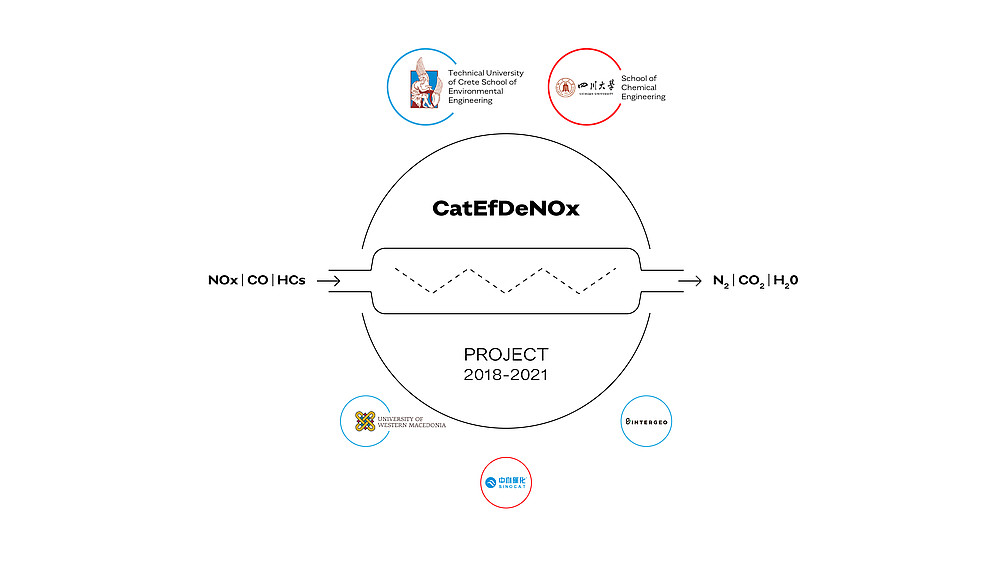PROJECT OBJECTIVES
In this project (CatEfDeNOx) a transnational consortium of 3 Academic partners (GR: Technical University of Crete, TUC and Western Macedonia University of Applied Sciences, TEIWM; CN: Sichuan University, SCU) and 2 Companies (GR: INTERGEO; CN: SINOCAT), with great multidisciplinary and complimentary set of skills/expertise and longstanding activities on Catalysts’ design and materials science and technology, Emission control catalysis and related subjects, are collaborating with the aim of developing novel, rationally designed nano-structured catalytic materials and devises for the efficient and selective abatement of NOx, CO and hydrocarbons form automotive (stoichiometric gasoline, diesel and lean burn engines) and stationary (fossil fuels and solid waste combustion) sources.
This will be accomplished via the rational synthesis and design of novel materials capable to overcoming the main disadvantages that have emerged during the ~40 years implementation of Three-Way-Converters (TWCs) in cars, namely: (i) high cost and quite low durability, (ii) complex synthesis (participation of 2-3 noble metals in their synthesis, with the rare and expensive Rh necessary), (iii) costly and difficult noble metal recycling, and (iv) formation of a notable portion of the highly undesirable N2O.
Motivated by recent achievements by the applicants in the field, the new catalysts will be monometallic, Ir-only, fabricated by advanced synthesis methods in order to achieve nano-structured Ir particles (1-2 nm) dispersed on active supports (CeO2-mixed oxides or perovskites) that can adjust the electronic state of the particles, induce promotional effects for reactions related to emissions control catalysis (ECC), and at the same time effectively stabilize the nanostructure, even under extreme operating conditions, as recently experimentally demonstrated and theoretically explained by the applicants. The significant synergy of H2 co-feed on the selective catalytic reduction of NOx by hydrocarbons, recently found, will be also considered in our designs.
CatEfDeNOx opens the route for the reintroduction of Iridium −a much cheaper noble metal compared to Rh, Pt and Pd, with exceptional catalytic properties in environmentally important catalytic reactions− to emission control catalysis implementations, the usage of which was standing aside due to its low stability at high temperatures and in particular at excess oxygen conditions (oxidizing environments).
Systematic catalytic and durability studies faced with detailed materials characterization studies, involving the performance of the novel catalysts on basic model ECC reactions, such as NOx+CO and NOx+HCs (+excess O2), CO and HCs oxidations, will be firstly conducted for an in depth understanding of the catalytic phenomena and metal-support interactions involved. These will be followed by performance tests at real conditions that correspond to four main implementation targets: stoichiometric gasoline, diesel/lean burn, fossil fuels and solid waste combustion emissions control. The latter studies will be performed on optimized synthesis catalytic washcoats loaded on macro-structured catalysts (honeycomb cordierite monoliths), as used in real exhaust after-treatment devices by means of a pilot scale evaluation unit and reactors that will be properly designed and manufactured.
The main objective of CatEfDeNOx project, is to develop novel catalysts and real size devices that will be highly active, selective, durable, cost-effective and readily recycled, enabling us for the efficient control of NOx, CO, light hydrocarbons, VOCs, and other complex emissions in a manner never tried before. Advanced, beyond the state-of-the-art, catalytic materials design, involving simultaneous adjustment of morphology and electronic state of the catalysts components by means of combined promotion and nano-structure stabilization concepts will allow us to do so.



